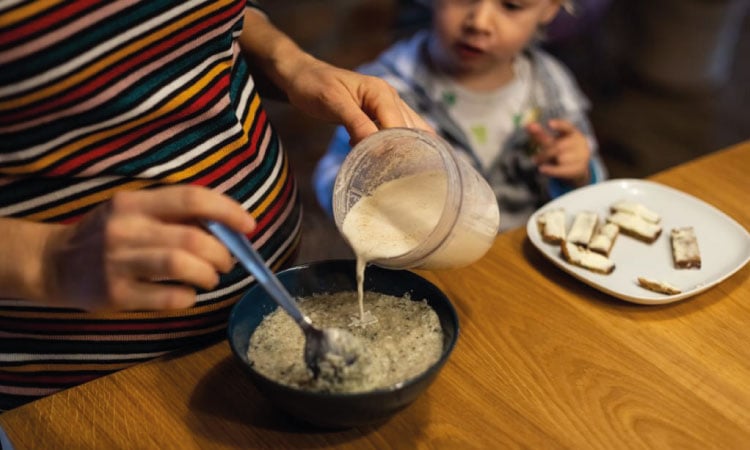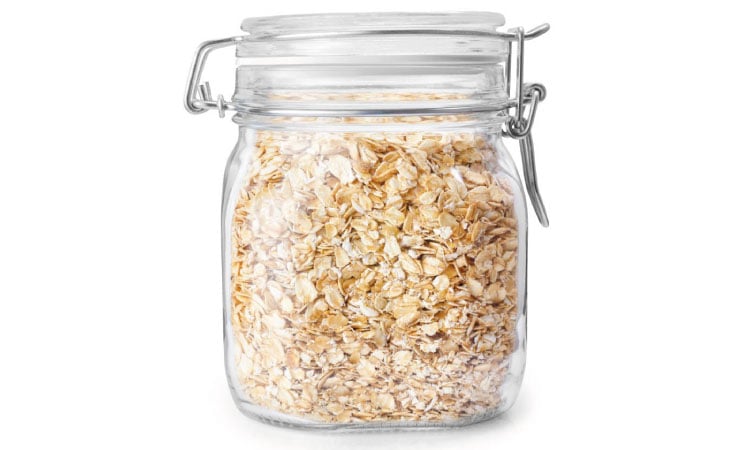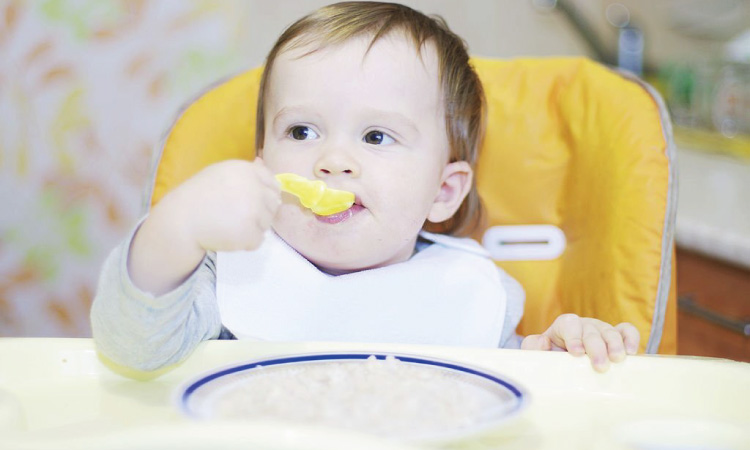Breast milk is the best for the baby for a few months. It is loaded with antibodies which help in making the immune system stronger. After six months, the babies need to be given solid foods as well. These are important for the healthy growth and development of the baby. Parents leave no stone unturned to add all possible foods that offer nutrition to the baby but not many parents know that oats for babies are an excellent choice to be added to the baby’s diet. These are nutrient-rich, high in energy, and have many other benefits.
Let us study the few postulates of having oats and other aspects of it.
Nutritional Value Of Oats
Oats are rich in nutrients and vital for your baby. According to a source, here is a complete list of nutrients that oats contain.
| Nutrition Facts | Per 100 grams |
| Energy | 379 kcal |
| Protein | 13.15g |
| Fat | 6.52g |
| Carbohydrate | 66.22g |
| Fiber | 10.1g |
| Sugar | 0.99g |
| Calcium | 52mg |
| Iron | 4.25mg |
| Magnesium | 138mg |
| Phosphorus | 410mg |
| Potassium | K362mg |
| Sodium | 6mg |
The nutritional composition of oats is well balanced. There is a good carbohydrate and protein content in this food, as well as a good balance of amino acids. A lot of oat lipids, unsaturated fatty acids, minerals, vitamins, and phytochemicals are found in oats. The grain has phenolic compounds that are nutritionally and functionally beneficial. No wonder since, oats have all the essential nutrients for children, it is an excellent choice.
Can Babies Have Oats?
Oats for babies are an excellent choice since they are loaded with vitamins, minerals, antioxidants, and fiber. They offer immense energy to the baby and help with digestion. Oats are lighter than rice and are also in the list of easy to make finger foods for babies with no teeth. This is the only cereal that causes the least allergy to children. Yet it is advisable to consult a doctor before introducing oats to the baby to rule out any other possibilities1.
When Can You Start Feeding Oats To Your Baby?

By the time the baby is seven months of age, it is advisable to start feeding oats to them. One can start with basic recipes like oats porridge and then enhance its flavor by adding vegetables and fruits to it. It is however advisable to only add one ingredient at a time for enhancing flavor. This approach will help to understand if the additional ingredient added is of the baby’s liking and to gauge if the baby is allergic to it or not2.
Cereal quantity and portions Age group 15g per day 6-8 months 30g per meal(2 portions a day) 1-3 years 30g per meal (4 portions a day) 4-6 years
Health Benefits Of Oats For Infants
As a good source of nutrition and with so many benefits, oats are a wonderful choice for babies. It is rich in minerals, fiber, and other essential nutrients. Nutrients play a crucial role in the growth and development of a baby. Oats are a healthy choice for babies. Since oats have sodium and potassium, they may help in developing neurological functions.
Let us look at how nutrients contribute to the growth and development of a baby.
1. Contributes to bone development
Oats comprise phosphorus and calcium which are good for building bone strength and results in strong bones. The presence of iron helps in maintaining hemoglobin levels and fighting anemia. Magnesium offers energy and boosts dental health3.
2. Offers energy
Oats are an excellent source of energy because of their high lipid content. Growing babies need a lot of energy. Babies will gain immense energy from oats and their growth and development will be enhanced4.
3. Reduce the risk of asthma
Children who are introduced to solid foods too early may be more susceptible to asthma and other allergies. However, this is not true for all foods. Introducing oats early, for instance, may be beneficial. In a recent study, infants who ate oats before the age of 6 months had a lower risk of childhood asthma.
4. Helps with digestion
Oats contain a lot of fiber, which is essential for regular bowel movements. Introducing solids can bring about digestive issues like constipation in bring about digestive issues like constipation in babies. Since a baby’s digestive system is still developing, oats can support digestion without stressing the system5.
Related Reading: How And When To Use Apple Juice For Baby Constipation (Till 2 Years)
5. Enables healthy growth
Oats have vitamin B6, folate, thiamine, riboflavin, vitamin E, and vitamin K6. These vitamins are important for the growth and development of babies. Thus, oats help in the growth and development of the baby.
6. Good for immunity
Oats comprise a sugar known as beta-glucans that boosts the production of immunity cells. Thus, oats help strengthen a baby’s immune system when consumed regularly7.
7. Helps to improve insulin sensitivity
Few infants are born with congenital type-1 diabetes. They can reap the benefits of consuming oats as this grain helps in reducing insulin resistance.
8. It helps to reduce inflammation
Oats comprise compounds known as avenanthramides. This compound helps to reduce inflammation which can be due to wounds and infections. Some infants have auto-immune diseases that can benefit from the anti-inflammatory properties that oats possess. It is also good for the skin of the baby8.
9. Relieves GERD
Some babies have GERD or Gastrointestinal Reflux disease that makes it difficult for them to digest the food. Under such circumstances, purees are recommended by doctors and oats are an excellent choice for these babies9.
Related Reading: When Can I Give Dry Fruits To My Baby
Is Oats For Babies At Night A Good Idea?

Oats are a filling meal, a healthy option for adults as well as babies. Besides being a sumptuous meal, it is a good source of melatonin that helps to boost the production of insulin. Insulin in turn helps to induce sleep. Oats can be prepared in many ways; porridge that is easy for the babies to digest. The same can be mixed with apples for enhancing the taste as well as the nutritional value10.
Side Effects Of Oats For Babies
Oats for babies is undoubtedly a healthy choice for babies, but since it is nutrient-rich, they can even have some side effects which should not be overlooked as well. Before introducing oats, however, it is a good decision to consult a doctor.
Few side-effects of consuming oats by babies are:
- Constipation- It is seen that introducing solid foods to the baby, leads to constipation. This happens since they are used to taking only breast milk and any other solid food is difficult to digest after that
- Allergies – It is seen that the biggest side-effect of consuming any solid food is that of an allergy. Oats usually do not cause allergies yet in some cases they can, especially when it has wheat gluten contamination. In case the baby has a gluten or wheat allergy, it can show signs within 2 hours of consumption. The signs of having an allergy are breathing difficulty, eczema, hives, abdominal pain, diarrhea, and nausea11
Things To Remember While Feeding Oats To Your Baby
Before including oats in the baby’s diet, a few pointers should be kept in mind. These will help to reap the maximum benefits one can get from its consumption and they are:
- Try and feed the baby plain and cooked oats and check for allergies. In case no allergies are seen, fruits and finely chopped veggies can be added but always consult a doctor if any allergies are seen
- Solid foods should be introduced after 6 months of breastfeeding to avoid any adverse reaction to the food
- It is important to select the right type of oats for feeding the baby. It is advisable to have steel cut-oats also known as semi-processed oats
- It is very important to boil the oats for a good half an hour till they turn soft enough for the baby to digest well
Types Of Oats Your Baby Can Eat
There are many varieties of oats that the baby can consume safely and some of them are:
- Steel-cut oats- These are whole oat grains that are cut into smaller pieces and carry the same nutritional value just like the whole oats. These oats also cook faster than the whole oats as they are already in smaller pieces. Steel-cut oats are the best to feed the babies as they are unprocessed and comprise oat grain nutrients
- Instant oats- The most processed oats that are rolled, boiled and dried before being packed. These are partially cooked and can even be found in ready-to-eat baby cereal. Only warm or hot water can be added to these oats, and they are ready to be consumed
- Course oat flour- This is prepared after pounding the whole oats grain and oat flour that has a lot of fiber is prepared. Oat flour can even be found in the infant’s oat cereal mix as it mixes easily with hot water
- Rolled oats- These oats are steamed and are in the shape of oat flakes. These come in 2 types: slow cooking as well as fast cooking. These oats must be properly boiled in water for at least 10 minutes. After this, the oats should be well mashed before giving to the baby
- Baby oatmeal cereal- This comes in powder form, so one must mix it with breast milk, water, or formula, mix well and then give it to the baby. In case one cannot find the regular oatmeal, it is advisable to cook it well and then puree it to a smooth consistency and then feed the baby
Related Reading: Cow Milk For Babies – Benefits, Risks, And Precautions
How To Select And Store Oats?

Even though the baby can consume any type of oats, it is not advisable to give them instant oats or over-processed ones since their nutrient value is not too high. It is best to go for steel-cut or regular oats.
Storage: It is important to know the right method to store oats for keeping them safe. Some pointers to remember in this context are:
- Oats should always be stored in airtight containers
- They should be kept in a dry and cool place for longer life
- In case the house is too warm, the oats can even be kept in the refrigerator
Thus, children are born with immense energy, and as they grow their movements increase as well. It is thus crucial to give them healthy and nutritious food. It is vital to add whole grains, nuts, different kinds of fruits and vegetables to keep them full and not to miss the daily nutrition dose.
FAQs
The indicators of having an allergic reaction to infant oatmeal are diarrhea, eczema, breathing issues, vomiting, etc. These signs would appear within a few hours of consuming oatmeal in babies.
Health experts strictly advise feeding the baby only formula or breast milk for the initial six months but few people do introduce oats to babies at 4 months.
Oats are undoubtedly a healthy option but always consult the doctor so that its benefits can be reaped by the baby.
The baby is ready by four to six months of age to consume oats. But it is important to consult a doctor before going ahead.
The child should be able to sit upright with a little support and it is also important that he can mash and swallow the food. Always remember to give small bites and not too big ones.

